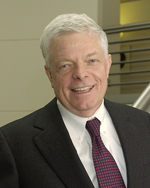Donald Fraser lauded for contributions to aeronautics and astronautics
AIAA names BU Photonics Center director an Honorary Fellow

It would be an understatement to say that Donald Fraser has made valuable contributions to aeronautics and astronautics. For example, the Photonics Center director spent nearly three decades at Draper Laboratory, which devised the flight control systems for NASA’s Apollo moon missions.
The American Institute of Aeronautics and Astronautics (AIAA) recently recognized Fraser’s accomplishments in the fields by electing him an Honorary Fellow. Also receiving this distinction are Michael Griffin, NASA administrator, and Alan Mulally, Boeing Commercial Airline Company president.
“Donald Fraser has excelled at every one of his endeavors,” says AIAA President Roger Simpson. “His credentials are impressive — from his government service to his managing the development of high-technology enterprises. He also founded the Journal of Guidance and Control and served as editor-in-chief of this AIAA publication for 14 years.”
Fraser was Draper Laboratory executive vice president and chief operating officer during his last 10 years there. Draper, an MIT spin-off, developed not only the Apollo flight control system, but also the space shuttle control system, the guidance systems for the Trident and MX missiles, and the world’s first digital fly-by-wire control system, which is used in nearly every military and commercial aircraft in the world.
Fraser’s contributions to the U.S. space program have continued into this millennium: last year he chaired a committee commissioned by NASA to assess the relative merits of four possible systems integration approaches proposed for Project Constellation, the program to build the crew exploration vehicle and related exploration systems to return American astronauts to the moon — and eventually put them on Mars.
In 1994 Fraser helped launch the Photonics Center at Boston University to identify, develop, and commercialize technologies based on the practical application of light. Prior to joining the University, he served in the George H. W. Bush administration as the principal deputy undersecretary of defense for acquisition. Appointed by the president to the Senate-confirmed position, Fraser was the number-two acquisition official, responsible for managing the acquisition process — setting policy and executing programs — for the entire Department of Defense. He was accountable for an annual budget of approximately $100 billion.
Being named an AIAA Honorary Fellow is the highest accolade that can be bestowed by the institute. Fraser joins an elite group that includes Orville Wright, co-inventor of the airplane, Neil Armstrong, the first astronaut to walk on the moon, and Robert Crippen, the first space shuttle pilot. “I’m extremely flattered,” says Fraser. “Look at the company I’m in — including such aviation industry giants as Bill Boeing and Donald Douglas.”
Fraser, Griffin, and Mulally will be honored at the annual AIAA Fellows Dinner on April 24. Fraser will also be recognized at the Aerospace Spotlight Awards Gala on April 25. Both events take place in Washington, D.C.